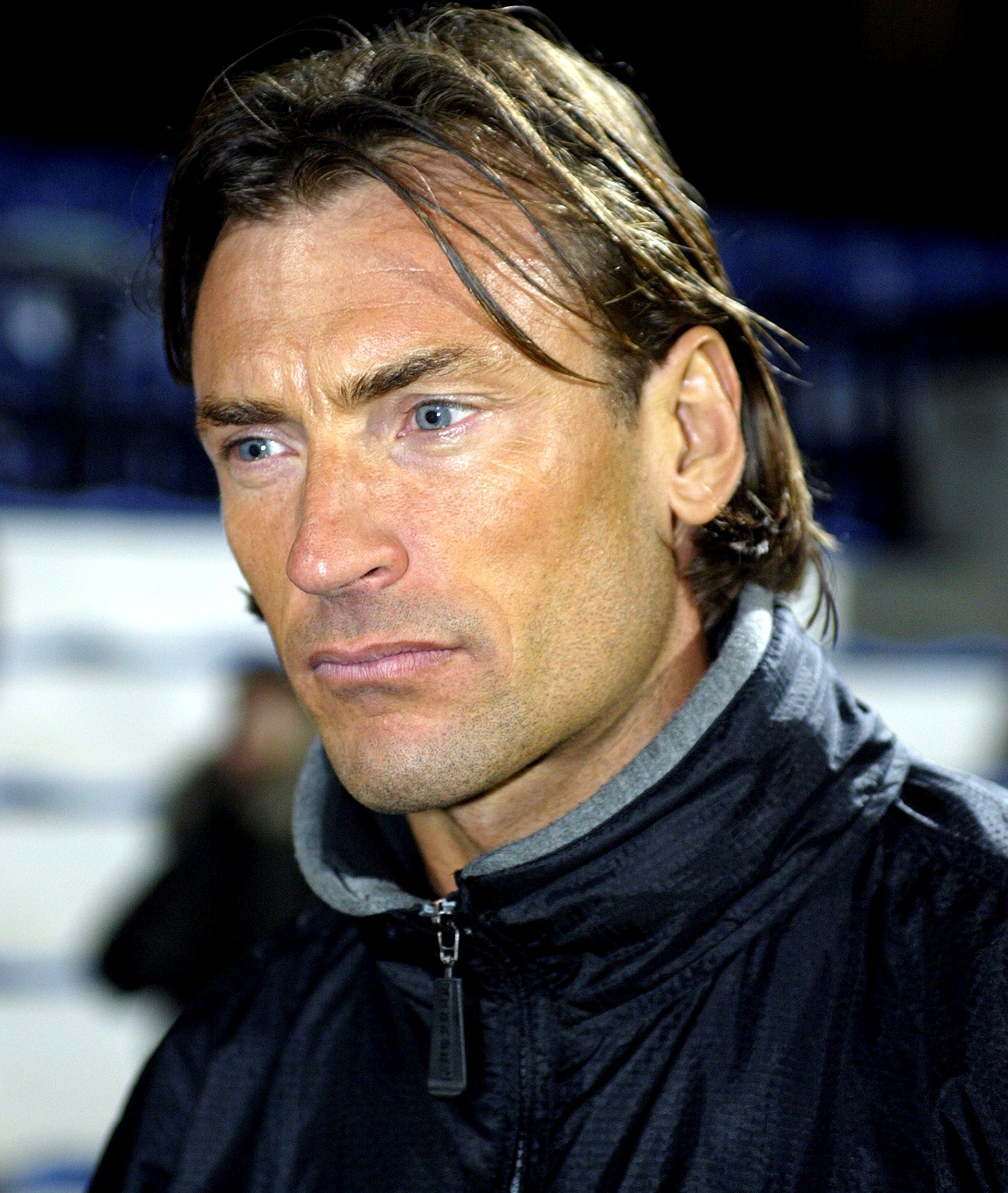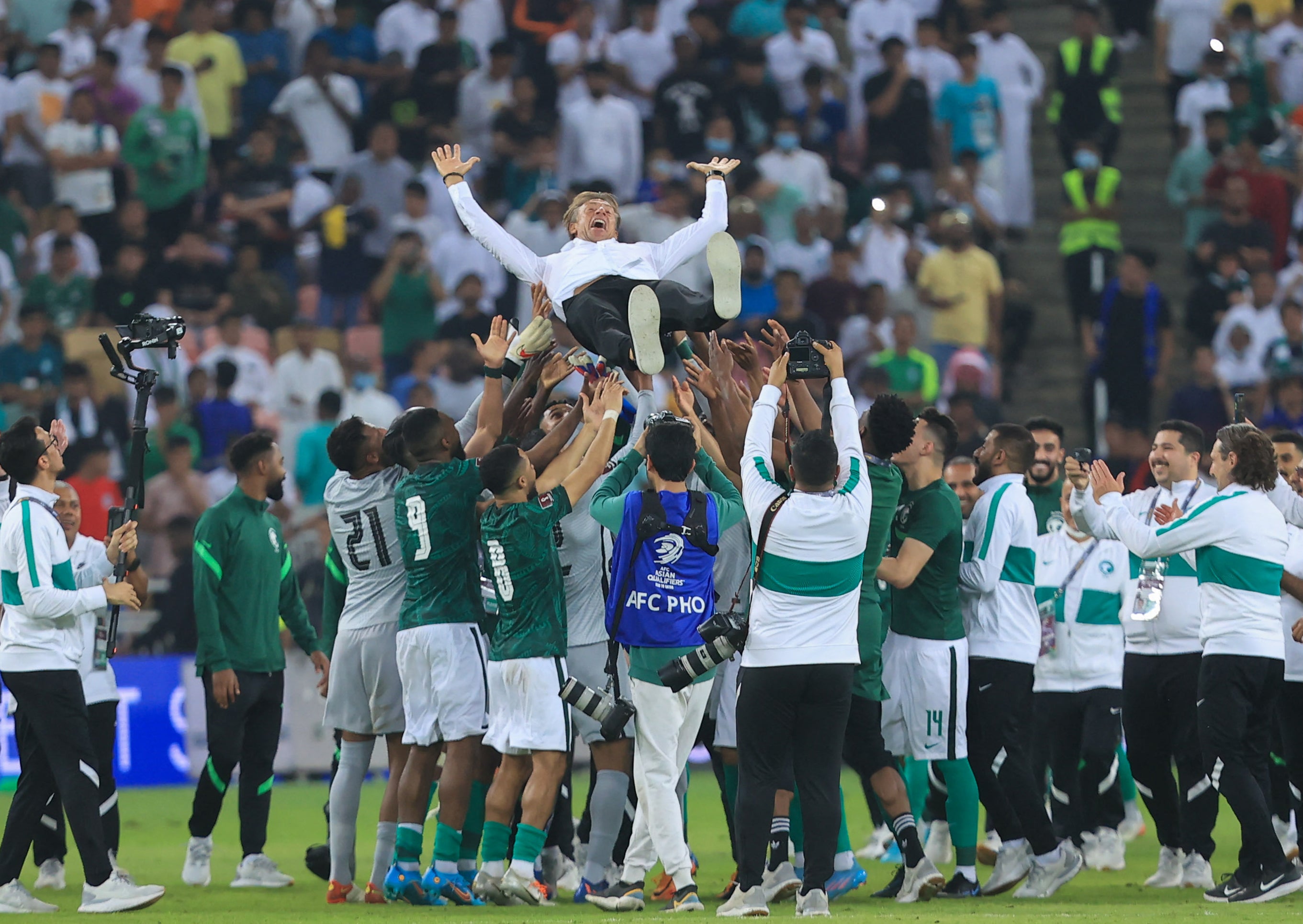
The League Two contingent at the World Cup is small. Understandably, too, given that even its leaders only stand 69th in the English pyramid. The fourth tier’s representatives are team-mates in their country’s colours: Swindon’s Jonny Williams and Chris Gunter, the first Welshman to win 100 caps, of AFC Wimbledon.
But the division’s alumni stretch beyond the Wales dressing room, and not merely because of the loan spells Jordan Pickford, Nick Pope and Ben White spent there when they were relative unknowns. Few in Qatar will boast a more eclectic CV than Herve Renard, current manager of Saudi Arabia, formerly in charge of Ivory Coast, Morocco, Zambia and, incongruously, Cambridge United.
It may not rank as a career highlight for the 54-year-old. The first manager to win the African Cup of Nations with two different countries left with Cambridge propping up the table and on their way to relegation from the Football League. Perhaps those 2004 defeats to Boston, Grimsby and Halifax do not serve as perfect preparation to face Mexico, Argentina and Poland in the next few weeks. Certainly, his career has not been defined by an early hiccup.
If confusion surrounded Renard’s arrival at the Abbey Stadium and demotion followed his departure, there was early evidence of the prowess that propelled him to success elsewhere, as well as reasons he struggled in Cambridge.
“If you look back at it now, he was ahead of his time. Some of his ideas were very different to what League Two football was like in that era,” said John Ruddy, later an England international and a Premier League regular with Norwich but then a teenage goalkeeper on Cambridge’s books.
Three years earlier, United had been managed by John Beck, a high-priest of long-ball football. Renard came with a contrasting approach. “Tactically, definitely,” Ruddy said. “League Two was very different back then. He wanted to play with possession.” Renard lacked the players, or at least those attuned to such methods, to do so.
But Renard was a progressive choice in another respect. Ruddy was given his debut by the Frenchman. “I was only 17 and 18 when he was there,” the current Birmingham player said. “He gave me my opportunity in the first team and he wasn’t afraid to pick young players. I look back on my time with Herve with very fond memories. In terms of the man, he was very pleasant but he demanded the highest standards.”
Those standards were most apparent on the training pitch. Renard was a fitness freak who practised what he preached. “In pre-season, we had three sessions, one at six in the morning, one in the afternoon, one in the evening,” Ruddy recalled. “It was still the hardest I have worked in pre-season.”

The hardest worker of all was the manager. At 54, Renard still looks in formidable shape. Then in his mid-thirties, a few years after his own playing days had ended, he set the tone. “Oh, absolutely,” Ruddy said. “In runs, he would be out the front. Sometimes when you are in the manager’s group for a run, you can take it a bit easier but he was probably the fittest guy at the club. He was a proper machine.”
Renard was able to lead by example. Communication could be a problem in other respects and the difficulties were not confined to him. When Renard joined Cambridge, he was billed as the sidekick to his mentor Claude Le Roy, who was then described as “one of the most respected managers in Europe, if not the world,” by chairman Gary Harwood. Le Roy had managed Senegal and won the African Cup of Nations with Cameroon. Renard accompanied him from Shanghai in March 2004, walking into a relegation battle that Cambridge duly won.
And yet what Harwood had termed “possibly the most exciting appointment the club has made in its entire history” was not entirely what it seemed. Ruddy explained: “It was such a strange situation because, initially, we all thought Claude was going to be the manager and Herve was coming in as coach but we quickly realised that Claude wasn’t going to be spending much time at Cambridge and Herve was the actual manager. There were problems at the club that I probably didn’t appreciate at the time.”
One issue was evident. A talented coach struggled to make himself understood. Renard has subsequently admitted he carried an English dictionary around in his back pocket; Cambridge’s budget did not stretch to an interpreter. “He was a very emotional character,” Ruddy said. “His English wasn’t great so when you can’t get your message across to the players, you are emotional.”

It was why he was not surprised some of Renard’s subsequent success came in French-speaking countries. Not arguably his greatest triumph, however. Zambia were ranked 71st in the world when Renard masterminded their victory in the 2012 African Cup of Nations.
In 2015, he regained the title with Ivory Coast, who had not been continental champions for 23 years. In 2018, he led Morocco to their first World Cup for two decades and drew with Spain.
Now a managerial wanderer steered Saudi Arabia through qualifying. His World Cup begins against Lionel Messi and Argentina. It will be a far cry from managing Cambridge at the foot of the Football League.







